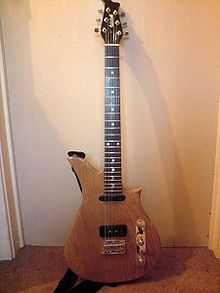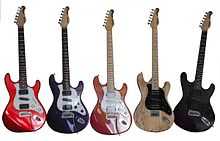Chris Eccleshall
Christopher J. Eccleshall (born 26 May 1948) is an English luthier, guitar designer, guitar dealer and authorised repairer of Martin, Gibson and Guild guitars,[1] and also received the blessing of Mario Maccaferri to make reproductions of his Selmer-Maccaferri jazz guitars.[1]
His main business is making custom-built acoustic and electric guitars, although he also produces a standard range of solid body electrics under the name "Electric Lady." He also makes solid bodied electric mandolins,[2] acoustic mandolins, mandolas and bouzoukis.

Eccleshall originally trained as a violin maker with W. E. Hill and Sons of Bond Street, London, who at the time were the number one violin company in the world.[3] He was also an engineer in the Fleet Air Arm. Later he moved to Ealing Strings at Ealing Common, London.[4] During this time Eccleshall still found time to make and repair guitars, eventually becoming so busy he set up his own workshop and went into making guitars full-time. British guitar makers were virtually unheard of at the time, but Eccleshall was one of the first to win recognition, along with Tony Zemaitis and John Birch. Week after week the three were involved in a competition to get their outlandish guitar designs onto Top of the Pops[5] during the heyday of British Glam Rock. Although his name is better known to insiders than to the general public, Eccleshall is now well established as one of the world's leading guitar makers.
Celebrity customers
Over the years Eccleshall's customers[6] have included Pete Townshend, Dave Davies, David Bowie, Rory Gallagher,[7] Paul Weller,[8] Davey Arthur (The Fureys), The Sweet,[9] The Cure,[10] The Levellers,[11] New Order,[12] The Alarm, This Picture, The Men They Couldn't Hang, Steven Woodcock, Richard Stilgoe and Richard Digance.
Collaborations

In the early 1980s Eccleshall struck a licensing deal with the Japanese-made brand Kimbara to make and distribute an Eccleshall-designed Stratocaster-style guitar. Eccleshall travelled to the Japanese factory to supervise the setup and was very pleased with Japanese engineering standards. These guitars are very rare in Europe and are mostly now in Japan and America. In 1986 Eccleshall uprooted from his native Ealing to move to Dartington and a few years later moved his workshop again to Buckfastleigh. In 2008 he met local timberman and guitarist Eddie Cameron and together they began a new series of co-designed guitars handmade by Eccleshall to a standard design and marketed under the name Electric Lady, again based on the Stratocaster but with locally sourced timber and British humbucking pickups. He now works at his home in Ipplepen.
Training
Eccleshall has worked with many apprentices and assistants and has trained and advised other luthiers including George Lowden[13] and Kevin Chilcott[14] throughout his career.
Innovations
Eccleshall has been responsible for several inventions[12] for which he never received the credit. He claims to have been the first to house a guitar neck's truss rod in an alloy U-channel, made the first sideless hardtail bridge for a Telecaster (without the original design's raised edges, intended to hold a chromed pickup cover which hardly anyone uses), and pioneered the rectangular solid machined steel block bridge saddles which are now the standard type on modern Telecasters & Stratocasters. He also built a solid body electric sitar - not a sitar guitar but a real sitar[15] - for the late John Perkins.
Historic guitars
Eccleshall was responsible for rebuilding Pete Townshend's smashed guitars[12][16] until he found it too upsetting to continue. He still possess an SG body with a Meher Baba sticker from that era. He was Rory Gallagher's favoured guitar technician from 1971 to 1985,[17][18][19] rebuilding and re-fretting his battered Fender Stratocaster at least 15 times (including a neck change), and was responsible for disabling the Strat's vibrato mechanism using a wooden block, a modification he was later also commissioned to apply to Eric Clapton's "Blackie".
Original designs
The Eccleshall Scimitar (24.75" scale), Barracuda (25.5") and Excalibur bass have original shapes based on outward curves, rather than the inward curves of traditional electric guitars derived from the rounded classical guitar.
Variations
Eccleshall's C-Model acoustic guitar has a classical guitar shaped body, but for steel strings. His "Special" is a variant of this. Many of Eccleshall's standard designs are modified versions of shapes associated with Gibson guitars. His B-Model acoustic is based on the J-200 acoustic, but is smaller. The Kestrel and Falcon electric guitars have solid bodies but with a 335 outline. The MC Model has the 175 outline but in 3/4 size with a slimline body. His 335-style bass is a unique hollow-bodied instrument used by Eddie Macdonald of The Alarm, Peter Hook of Joy Division & New Order and Simon Gallup of The Cure. Eccleshall's solid electric mandolin[20] is used by many electric folk bands and features a pickup hand-wound by Eccleshall.
References
- ↑ 1.0 1.1 (Thomas, Richard (February 2002). "Chris Eccleshall". Acoustic magazine.)
- ↑ http://commons.wikimedia.org/wiki/File:Rory%27s_boys.jpg
- ↑ (Percival, Eamonn (November 1975). "Chris Eccleshall". International Musician and Recording World.)
- ↑ (Hayes, Chris (July 1970). "Making It...". Melody Maker.)
- ↑ http://www.youtube.com/watch?v=WgiDINcZ-q4
- ↑ (Clerk, Carol (? 1975). "Chris is in tune with the stars". Ealing Gazette. )
- ↑ http://www.roryon.com/Rorystory.html
- ↑ http://www.youtube.com/watch?v=lGsyL6DhgPU
- ↑ http://www.youtube.com/watch?v=6grs9Aj5NOw
- ↑ http://www.youtube.com/watch?v=zd6EpZEFfVE
- ↑ http://dreyfus.chemistry.sjsu.edu/~pfleming/lvlrs/levsfaq.html
- ↑ 12.0 12.1 12.2 (TGM (September 1996). "Southern Strumfort". Guitar magazine.)
- ↑ http://web.mac.com/gsl71/George_Lowden_Website/Lowden_History.html
- ↑ http://www.audiomastermind.com/detail-kevin_chilcott-699.html
- ↑ http://archive.middevonstar.co.uk/2001/7/18/43265.html
- ↑ http://www.lespaulforum.com/forum/showthread.php?t=134223
- ↑ http://www.roryon.com/collection.html
- ↑ http://www.roryon.com/guitarist.html
- ↑ http://www.roryon.com/guit231.htm
- ↑ http://www.emando.com/reviews/Eccleshall.htm
External links
- Official website
- Official Electric Lady MySpace site
- Rory Gallagher's guitars including Eccleshall guitar, mandolin & mandola